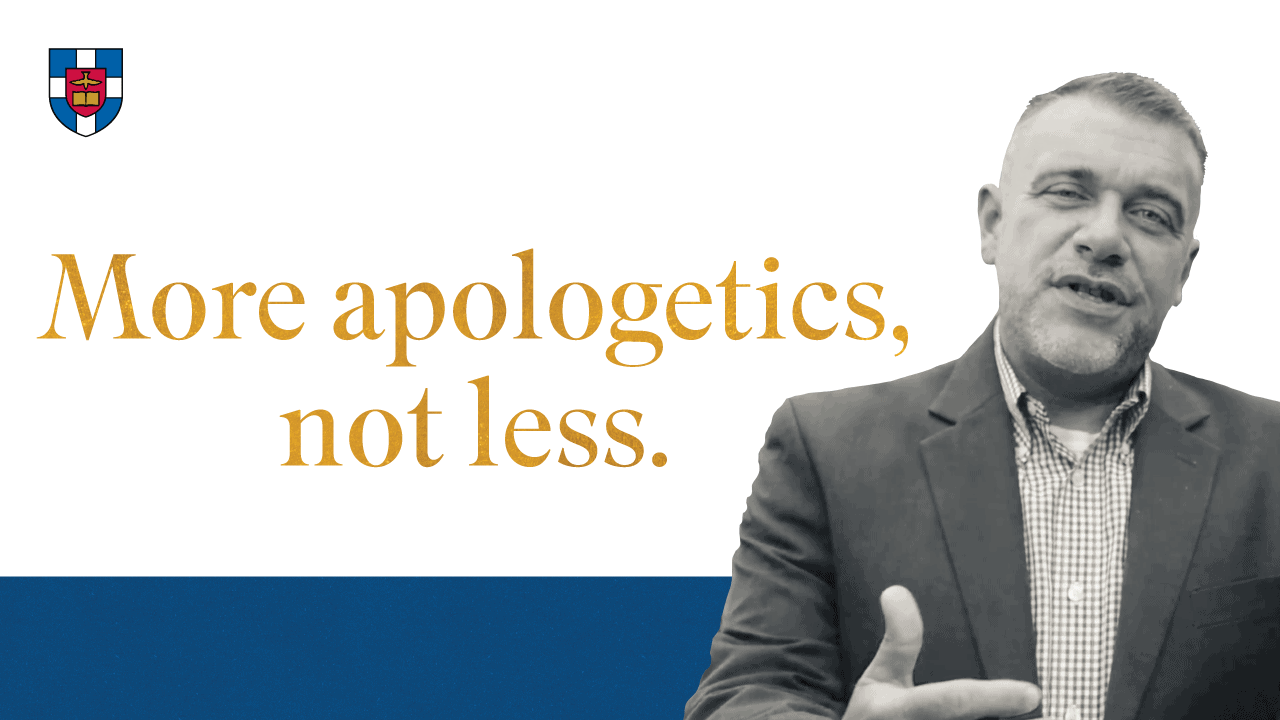Welcome to the Deeper-Than-Usual Episode! This episode has been named “the Deeper-Than-Usual Episode” mostly because it is a bit deeper than usual. Dr. J.V. Fesko—professor of systematic and historical theology at Reformed Theological Seminary, author of Reforming Apologetics, and all-around very deep person—joins the dynamic duo to discuss many deep things. Dr. Fesko momentarily risks his deep reputation by admitting his deep longing to sing like David Lee Roth, who is not a deep person according to certain anonymous reports and to anyone who’s ever seen him in concert. However, Dr. Fesko quickly recovers his much-coveted mantle of deepness by deeply discussing presuppositionalism, reforming apologetics, and historic worldview theory, all of which are very deep topics. Also, “Mantle of Deepness” would be a great name for a band and by “great” we mean terrible.
In the second half, your intrepid cohosts discuss a song that forces them to wade into even deeper thoughts than Dr. Fesko’s much-coveted mantle of deepness. The song is “Freewill” by Rush, and the deep topics include determinism, libertarianism, compatibilism, Molinism, and whether or not a fish can become a helicopter. According to Garrick, fish cannot become helicopters; Scott Stapp, lead singer and chief arm-spreader in the band Creed, deeply disagrees and even sings a song entitled “Marlins Will Soar.” This song is apparently about how marlins can turn into helicopters while playing baseball and even fly to the World Series if they are sufficiently optimistic.
This week’s Toybox Hero Tournament pits a pig against a magical object from Harry Potter and the Prisoner of Azkaban. The pig-versus-Potter conflict is so intense that confusion reigns until a song from Cher shows up on the deck of a ship in the deep ocean to render a verdict. The result is bacon.

This Week’s Guest to Talk About Reforming Apologetics
Dr. J.V. Fesko, Author of Reforming Apologetics
J. V. Fesko serves at Reformed Theological Seminary (Jackson) as Professor of Systematic and Historical Theology. He is an ordained minister in the Orthodox Presbyterian Church and has served in church planting, pastoral ministry, and teaching for more than two decades. Fesko has authored or edited more than twenty books and written dozens of published essays for various journals and books. You can find out more about Fesko at his blog Reformed Theology.
Links to Click
Theology of the Reformers: book by Timothy George
Reforming Apologetics: book by J. V. Fesko
Nature and Scripture: essay by Cornelius Van Til
Post-Reformation Reformed Dogmatics: 4-volume work by Richard Muller
Lectures on Calvinism: lectures by Abraham Kuyper
The Long Shadow of Racism in America: article by Timothy Paul Jones
The Gospel and the Pursuit of Justice in Your City: article by Jamaal Williams, Timothy Paul Jones, and Jarvis Williams
Permanent Waves: album by Rush
Freewill: song by Rush
Does God Know the Future?: interview with Thomas Flint
True Spirituality: book by Francis Schaeffer
How to Make Three Chords and the Truth More Amazing than It Already Is
Support the show and spread the word! Here are a few ways to do that:
1. Subscribe to Three Chords and the Truth: The Apologetics Podcast: Apple / Android / RSS.
2. Leave a rating and review on iTunes to encourage other people to listen to the show.
3. If you purchase any of the books mentioned in Three Chords and the Truth, consider using the Amazon links provided in the show notes. The show will receive a small percentage of each sale.
4. Visit our Patreon site where you can support the podcast, suggest future songs or topics, and order Three Chords and the Truth merchandise.
5. Make contact with us on Twitter: @DrTimothyPJones @GarrickBailey @ApologeticsPod
The Closing Credits
Three Chords and the Truth: The Apologetics Podcast thanks B&H Academic for their sponsorship. Music for the podcast has been licensed through Artlist.io and performed by Trent Thompson. Brief excerpts of music played in each program are included solely for the purposes of comment and critique as allowed under the fair-use provision of U.S. copyright law. “The fair use of a copyrighted work … for purposes such as criticism, comment, news reporting, teaching, … scholarship, or research, is not an infringement of copyright” (U.S. Code § 107, Limitations on exclusive rights: Fair use).


